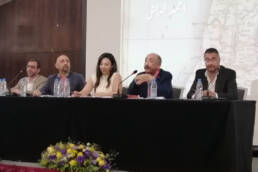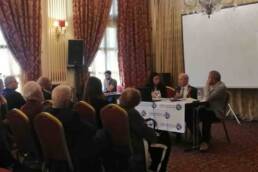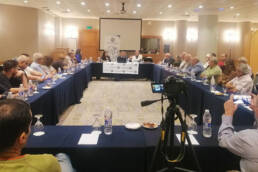The Center for Arab Unity Studies organized a webinar via Zoom on the Crisis of Arab economies and ways out of it on Wednesday, July 27, 2022. The main speakers at the webinar, which lasted about two and a half hours, were Hassan Boukrein, a lecturer and Dean of Economics Department at Laurentian University in Canada; Ayman Noureddine Omar, lecturer at the Faculty of Business Administration at the Lebanese University; and Wael Gamal, journalist and researcher in political economy.
The webinar was moderated by Luna AbuSweireh, Director-General of the Center, who considered that the Arab region is affected by the consequences of global economic crises, starting with the downturn resulting from the Corona pandemic to the Russian-Atlantic war. The Arab region is also “exhausted by conflicts, “prohibited Arab development”, and the aggravation of the debt crisis of Arab governments which exceeds a trillion and a half dollars in 2022, according to the International Monetary Fund reports”, as AbuSweireh said; stressing on the urgency to change the Arab economy from a rentier one to an integrative economy that adopts socialist development economic policies.
Dr. Hassan Boukrein said that “a rapid intervention is required from Arab states that must play a key role in providing the basics of decent living even in the capitalist systems.” He also defended the option of “debt from the Central Bank”, which was criticized by some other speakers. He highlighted the importance of a “political solution”, because “the origin of the problem is political by choosing to follow a certain economic path by the ruling political class not another”. He also clarified that the state has two choices, either debt or an austerity policy, and the first is better provided that the debt is used for productive sectors.
Dr. Ayman Nour El-Din Omar mentioned three main flaws in Arab economy, first of which is importing economic models from abroad instead of building local economic models based on the internal components and human resources of the state; The second is the nature of Arab political systems, which are either clan-based or dictatorial. Therefore, they perpetuate an economic reality that makes the citizen subservient to them and ensures their continuity. As for the third element, he considered corruption the most important cause of economic crises in the Arab world.
Omar also criticized the nature of the rentier Arab economies, as their public budgets depend up to 90 percent on natural resources or debt, and “food insecurity” problem. He considered that the solution is security and political related, and the proof is that “the index of hunger is higher in Arab countries that suffer from armed conflicts”, according to him, in addition to the urgency to exploit natural resources like Land reclamation for agriculture and water resources.
On the other hand, Mr. Wael Gamal listed four complex global economic crises today, first of which is the global economic crisis that has been going on since 2007/2008; the Corona pandemic crisis, that exposed health systems which revealed the withdrawal of the role of the state due to neo-liberalism, not only in the Arab world, but worldwide. The third crisis, according to Gamal, is climate change, as we are already paying very high expenses for environment damage. And the last component of the complex global economic crisis, as he said, is the Russian-Ukrainian war, which increased the expenses of trade, import, and transportation.
Gamal attributed the failure in the Arab world to the implementation of the neo-liberal project in recent decades, in which some classes benefited at the expense of the largest segment of the people, due to policies based on the state’s evasion of its responsibilities in social protection or eliminating poverty. Gamal added that “people of the Arab region paid the highest price for these policies, and since the 2007/2008 crisis, Arabs have highest percentages in terms of severe austerity policies, reducing public spending at the expense of state services, and bearing the largest tax burden for people with low incomes, until the percentage of affected people reached about 80 percent of the population.” He added that “despite all this austerity, the deficit of Arab budgets has increased, and spending on public debt service has taken a high proportion of public spending”. In addition, he considered the high interest rates as a great mistake.
The Director of the editorial department at the center, Fares Abi Saab, also intervened at the end of the webinar considering that “the political classes in the Arab world do not want to adopt the right decisions to address economic crises”. Abi saab also pointed to the importance of developing our economic policies, criticizing the absence of any clear economic visions among the forces brought about by the so-called “Arab Spring”.
In conclusion, AbuSweireh focused on the need for “experimental theorizing” to know which path to follow to get out of the crisis, and for studies that identify deficiencies, as well as the necessity of evaluating current and past experiences.
The video of the webinar is available on our You Tube channel
مركز دراسات الوحدة العربية
فكرة تأسيس مركز للدراسات من جانب نخبة واسعة من المثقفين العرب في سبعينيات القرن الماضي كمشروع فكري وبحثي متخصص في قضايا الوحدة العربية
We appreciate your support
SUPPORT THE CENTRE FOR ARAB UNITY STUDIES
The Centre is reaching out for its friends and readers for support, whether by ordering our publications and paying for them in hard currency, or through donations. The Centre welcomes any support to boost its resiliency, to ensure its survival, the continuation of its legacy and its commitment to tackle issues facing the Arabs and the Arab world.



